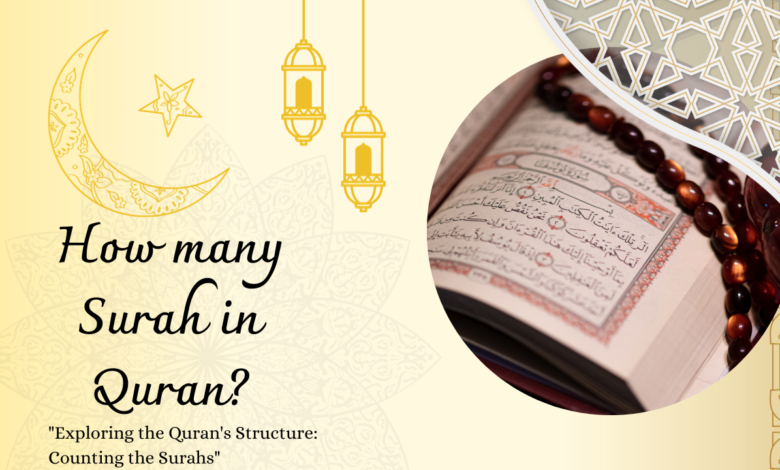
How many Surah in Quran?
There are 114 Surahs in the Quran.

Introduction
The Quran, also spelled as Qur’an or Koran, is the holy book of Islam and is considered the literal word of God as revealed to the Prophet Muhammad (peace be upon him) over a period of approximately 23 years. It serves as a guide for Muslims in matters of faith, practice, and daily life. One of the fundamental aspects of the Quran’s structure is its division into chapters known as “Surahs.” In this article, we will explore the Quran’s composition and answer the question: How many Surahs are there in the Quran?
The Structure of the Quran
The Quran consists of 114 Surahs, making it a comprehensive and intricate text. These Surahs vary in length, with some consisting of just a few verses, while others contain over a hundred verses. The Quran is written in Arabic, and each Surah is named and numbered. The Surahs are further divided into verses called “Ayat,” which are the building blocks of the Quranic text. In total, there are over 6,000 Ayat in the Quran.
Also Check
- What is Judgement day in Islam?
- Where did Christianity start?
- Anger Management in the Light of Quran and Sunnah
- Rights of a Muslim Wife upon Her Husband
- What does all hallows eve mean?
The Quran’s divisions into Surahs and Ayat serve several purposes:
- Ease of Recitation: Dividing the Quran into Surahs and Ayat makes it easier for Muslims to recite and memorize. The shorter Surahs are often memorized by children and adults alike as part of their religious education.
- Thematic Organization: The Surahs are not arranged chronologically but rather according to their themes. The longer Surahs often deal with complex legal and theological matters, while the shorter ones may focus on simpler and more fundamental aspects of faith and guidance.
- Guidance for Various Situations: The diverse range of Surahs provides guidance for Muslims in different aspects of life, including prayer, family, morality, and community. This ensures that the Quran is a comprehensive guide for all aspects of human existence.
- Spiritual Significance: Each Surah carries its own spiritual significance, and Muslims often recite specific Surahs during prayers and other religious rituals for various purposes, including seeking protection, forgiveness, or guidance.
Significance of 114 Surahs
The number 114 has significance in Islamic tradition. According to Islamic scholars, 114 Surahs in the Quran correspond to the 114 messengers and prophets sent by God throughout history to guide humanity. Each Surah serves as a reminder of the messages delivered by these prophets and the divine guidance provided to different communities.
Additionally, the Quran’s 114 Surahs emphasize the importance of diversity and unity in Islam. These Surahs guide Muslims to recognize the shared essence of the message brought by all the prophets, reinforcing the idea that Islam is the culmination of previous revelations.
Conclusion
The Quran, the holy book of Islam, is a profound and comprehensive text that consists of 114 Surahs, each with its own unique message and significance. These Surahs are further divided into Ayat, making the Quran a structured and organized guide for Muslims in all aspects of life. The division of the Quran into 114 Surahs is not arbitrary; it holds deep spiritual and symbolic significance, reminding believers of the prophets sent by God and the unity of their message.
Understanding the Quran’s structure and its 114 Surahs is essential for Muslims seeking guidance, knowledge, and spiritual growth. It serves as a reminder of the rich and diverse tradition of Islam, encompassing the teachings of all the prophets throughout history.

(FAQs) about the number of Surahs (chapters) in the Quran:
How many Surahs are there in the Quran?
There are 114 Surahs in the Quran.
Is the number of Surahs in the Quran fixed, or has it ever changed?
The number of Surahs in the Quran has always been fixed at 114 since its revelation to Prophet Muhammad (peace be upon him).
What is the significance of the number 114 in the Quran?
The number 114 signifies the total number of distinct chapters, each with its own unique content and message in the Quran. These chapters vary in length and cover a wide range of topics and guidance for Muslims.
How are the Surahs in the Quran organized?
The Surahs in the Quran are organized by their length, with the longest Surahs generally found at the beginning and the shorter ones towards the end. The only exception is Surah Al-Fatiha, which is the opening chapter.
What is the first Surah in the Quran?
The first Surah in the Quran is Surah Al-Fatiha, which is also known as “The Opening.”
What is the last Surah in the Quran?
The last Surah in the Quran is Surah An-Nas, which is also known as “The Mankind.”
Are all Surahs in the Quran of equal length?
No, the Surahs in the Quran vary in length. Some are very short, while others are longer, with Surah Al-Baqarah being the longest.
How do Surahs in the Quran differ from verses (Ayat)?
Surahs are the chapters or sections of the Quran, while verses (Ayat) are the individual lines or sentences within those chapters. The Quran is composed of Surahs, and each Surah contains a varying number of Ayat.
Can you provide an example of a Surah from the Quran?
Sure, an example of a Surah from the Quran is Surah Al-Ikhlas (Chapter 112), which is a short chapter that emphasizes the oneness of God.
Are there any Surahs that are recommended to be recited frequently?
Yes, certain Surahs, such as Surah Al-Fatiha, Surah Al-Ikhlas, Surah Al-Falaq, and Surah An-Nas, are often recommended for regular recitation in daily prayers and for seeking protection from various harms.






